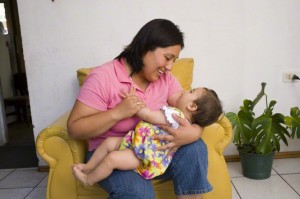Falling in Love with your Family by Alison
In a Nutshell: It is so much better to protect children than it is to heal adults. It is up to all of us to prevent child abuse.
I am feeling very tenderhearted today as Child Abuse Prevention Month draws to a close. Today, on average, 5 children died in America as a result of child abuse or neglect. Thousands of others survived in homes filled with hateful words, painful abuse, damaging neglect, and sexual exploitation. I recently read this simple poem about abuse:
Musical Lobotomy
If I could purge
that part of my brain
which stores pain,
I would replace it
with a gentle refrain;
Bach, Beethoven
or simply rain…
Susan Maree Jeavons
So many people try to go about their adult business with childhood-scarred hearts. Preventing it in the first place should be one of the primary goals of any society.
1. Children have a right to be raised by parents who are ready, whether those parents are natural or adoptive. There are many amazing and successful teen parents out there and my heart goes out to them for all they sacrifice for their kids. But we need to be very aware that these families are among the most at-risk for abuse and need the most support. If there is an unintended pregnancy, a teen mother should never be made to feel that raising her child is some form of restitution, with a “You’ve made your bed, now lie in it” mentality, or be shamed for giving up her “own flesh and blood.” Children learn responsibility by having paper routes and working part-time at McDonalds. The stakes are too high to expect a child to raise a child in the hopes that she will learn responsibility by being a mother. Many of us know families who have been blessed by forward-thinking and brave young people who give the ultimate gift by allowing adoptive parents to raise their child.
2. Help your family. Parents, let’s not take on our most important role in life with less training than if we had bought an iPod. We only have one shot at turning these little people into successful big people. There just isn’t time for experimentation at their expense. If things are not going well at home, then get some skills and get them quick. Search the internet, visit your library, talk to successful parents, and get some parenting resources. Seek professional help if you feel you cannot control your anger and frustration, or if you have thoughts about hurting your child. Unkind words that are spoken, needs that are not met, and innocence that is not protected cannot be taken back. They need so desperately for us to treat them well. Today I read a story that is understated, but is one of the most important things for parents to learn—that kids are people, too.
I’ll always remember a story [a friend] told me years ago when we were both young fathers. He said: “My little boy, who had been outside playing and eating candy, came in the house with a very dirty face. Some of the dirt seemed to be caked on. I picked up a handy cold, damp washcloth to wash him clean. As he looked up at me I thought, ‘Would I like my face washed with a cold, damp wash cloth?’ I decided I would not. So I turned on the hot water and rinsed out the cloth until it was soft and clean. Then I made it nice and soapy. With the warm cloth I gently washed his face just as I would like mine washed.”
To me that story says it all….We should not be rude to our child just because we can get away with it. We are responsible to correct them when their behavior or words take them away from family standards. The point is that in all matters of discipline there should be an underlying respect which makes it so that, even though our children are little, we do not treat them in a belittling manner.
(In FUNctional Families by George D. Durrant)

A parent might “get away with” mean, abusive, or neglectful behavior to a child, but those decisions damage generations. Parents, let’s do it right.
3. Help your community. There are so many families in crisis who need our support and encouragement. Take the time to get to know kids in your neighborhood or at church. Offer to babysit for a single parent, or invite a struggling family over to your house for dinner. So many problems can be avoided just by having good role models and support.
What happens if you suspect abuse may be going on? Please don’t ignore feelings of concern. If we suspect abuse or neglect and do nothing, we are partly to blame for that child’s treatment. Our involvement may be the only chance the family has to get help. Making a report to Child Protection authorities only means you have a suspicion of abuse. It does not mean you are sure. The number to call varies by state, but this is the national number that can put you in touch with your agency: 1- 800- 4- A- Child (1- 800- 422- 4453).
Child Abuse Prevention Month may just be in April, but as adults we have the responsibility to make sure the world is a safe place for children in our homes and communities all year long.